''Take your oil, but what will you do with it? – 'We will trade it''
7 Days: from the celebration of Day of the Republic of Tatarstan to the new school year
The previous week was rich for holidays and memorable dates for Tatarstan citizens. For example, the village of Yudino celebrated its 100 anniversary, the region traditionally celebrated Day of the Republic of Tatarstan on 30 August, and Knowledge Day gave start to the new school year. More details were discussed in the weekly news and analytical programme 7 Days broadcasted on TNV Channel. Read more in the overview of Realnoe Vremya.
The importance of the sovereignty of Tatarstan
Tatarstan celebrated Day of the Republic on 30 August. The Declaration on State Sovereignty of Tatarstan was adopted 28 years ago. The document was signed by Chairman of the Supreme Soviet of the Tatar Soviet Socialist Republic Mintimer Shaimiev — future first president of the republic. Since then, the date has become special for all residents of Tatarstan.
It was a romantic time, People's Deputy of the Supreme Soviet of the Republic of Tatarstan, now retired Fandas Safiullin says. Every year on 30 August he has his, as he says, ritual walks to the places of combat youth. Combat because passions were running high then in the 90s not only in the streets and squares of Kazan, but also inside the parliament. It was Fandas Safiullin who was entrusted by the members of the commission of the Supreme Soviet to read the text of the historical Declaration of State Sovereignty of Tatarstan.
Those are wrong who think that the acquisition by the republic of its statehood was a gift of fate. Or the weakness of the federal centre. Moscow had long known about the aspirations of Tatarstan to the new status. They also knew about the sentiments among local residents. Tatarstan objectively and fairly applied first for the status of a Union Republic, then, after the collapse of the USSR, for new relations within Russia itself. Tatarstan authorities did not declare a complete break in ties with the Russian Federation. But they proved decisively and convincingly that the status of an Autonomous Tataria within Russia did not exactly meet the new challenges of the time.
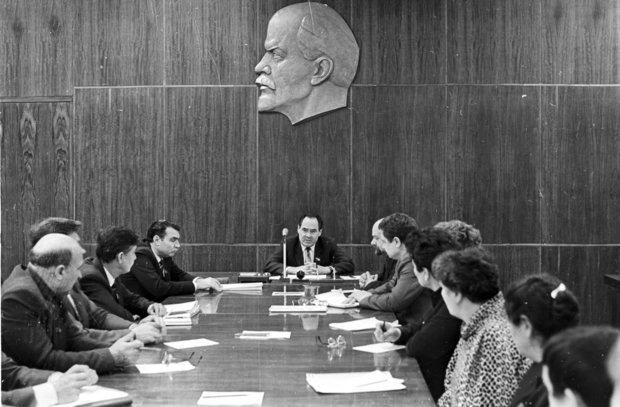
''By Russia we meant the USSR. No secession was considered, only raising the status. But black propaganda, unfortunately, presented it to the public as secession,'' says Fandas Safiullin.
Objectively and fairly, Tatarstan at that time had all strong legal arguments to declare its greater independence. In addition, Russia had already declared its independence by adopting its own Declaration on State Sovereignty in June 1990.
''Tatarstan, apparently, was guided by the words of French students who said: 'Be realistic, demand the impossible.' So Tatarstan demanded the impossible,'' said political expert Vladimir Belyaev.
A balanced but decisive position in the negotiations with Moscow was to be our adequate response. The leadership of the republic headed by first President Mintimer Shaimiev called the best intellectual forces of the Republic of Tatarstan for help.
Historian Indus Tagirov recalls that in these disputes the main arguments of the republic were reliance on the will and sentiments of people, common sense and impeccable legal framework. The Tatarstan's position was based on international experience and documents of the Russian Federation itself, the same Declaration of the Rights of the Working and Exploited People, which was included in the first Constitution of Russia.
Throughout all '90s Tatarstan in a difficult struggle consistently and gradually was building its own model of state sovereignty. The declaration, the referendum on sovereignty, its own Constitution and again difficult negotiations on the powers and the economic value of sovereignty.
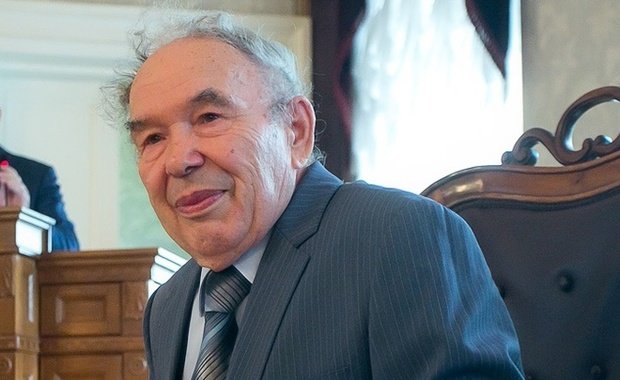
Indus Tagirov: ''Gaidar says: 'Take your rotten oil industry, take your oil. What are you going to do with it?' Then Mr. Sabirov (Prime Minister of Tatarstan — editor's note) comes to the rescue. 'We will trade it,' he said. Gaidar tells him: 'With whom?' Sabirov: 'With you, as under the Kazan Khanate.'' Photo: Roman Khasaev
''Gaidar says: 'Take your rotten oil industry, take your oil. What are you going to do with it?' Then Mr. Sabirov (Prime Minister of Tatarstan — editor's note) comes to the rescue. 'We will trade it,' he said. Gaidar tells him: 'With whom?' Sabirov: 'With you, as under the Kazan Khanate.' Everyone laughed, of course. As a result, we came from Moscow with the recognition of our property, single-channel tax, independent budget and National Bank,'' Indus Tagirov shared his memories.
''In Tatarstan, there used to be good scientific schools. These reserves are preserved. Now it is important to support this. And there is nothing surprising that in industrial, agricultural production there is a return. The vertical of power has been preserved here, which was built under the first president,'' says Shamil Ageev, Chairman of the Board of the Chamber of Commerce and Industry of the Republic of Tatarstan.
In economic terms, Tatarstan really managed to extract good dividends from its independence. It resulted not only in maintaining its competitiveness and investment attractiveness of the enterprise of the republic, but also tens, hundreds of large-scale social programmes.
The model of Tatarstan is a vivid example of competent, verified relations between the region and the federal centre. When it is profitable and easy for both parties to the agreement: for Tatarstan, which proved that it is able not only to loudly declare the special status and powers, but also to implement them in practice; for Moscow, which sees the result in the form of additional taxes and fees. Today, the centre's talks and actions aimed at oppressing the regions and their rights are working against the ideas of federalism, and therefore against Russia. This is the opinion of experts — people who defended the sovereignty of Tatarstan in the '90s.
''It is not only about the rights of the republic — in principle, about the essence of Russia, what it should be. The fact that the regions should have their own rights and opportunities,'' Indus Tagirov believes.
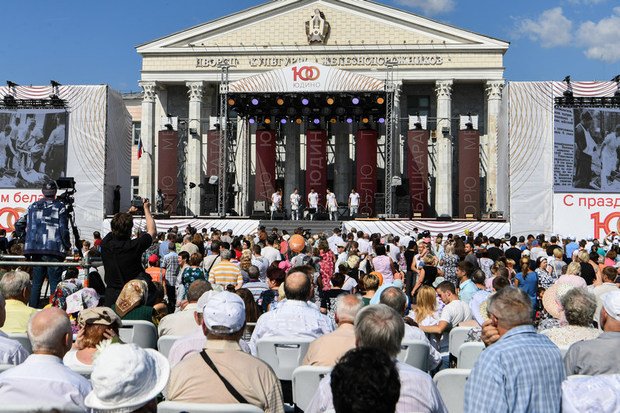
Yudino celebrates its 100th anniversary
The previous week was rich in memorable dates. The village of Yudino celebrated its 100th anniversary on August 29. At the turn of the 19th and 20th centuries, it was the railway station Krasnaya Gorka with a suburban village, where the Kazan intelligentsia used to relax. Now Yudino is a major transport hub, around which the village of railway workers has grown.
The intersection of Ilyich Street and Revolyutsionaya Street is a historical place. It is from here the village of Yudino originates. Until the mid-60s, when Yudino was joined to Kazan, the streets had other names. Ilyich Street is former Sovetskaya, Revolyutsionaya Street is former Rabochaya. It was along this street Yudino railway workers went to work.
''Even as a schoolboy, I discovered that in Yudino there were so-called professor's dachas. They were across the bridge — beautiful, with platbands,'' documentary director Gennady Panov recalls.
By the mid-60s of the last century, there were only half a dozen dacha houses left, but time also has not been kind to them. Now, on the site of the dacha village there have grown high-rise buildings.
The railway changes the usual way of life shortly before the First World War, when the construction of the new branch of the railway from Krasnaya Gorka to Yekaterinburg begins, and the dacha village turns into a working one. Now there are powerful electric locomotives in the locomotive depot, capable of pulling freight trains weighing 9,000 tonnes. But in 1915, the station had only a small depot for elegant 'sheep' — steam locomotives of O series, the workhorses of the tsarist railway, and then the young Soviet Russia.
The national archives of Tatarstan carefully store the documents related to the history of the village. The unique photo of Yan Yudin, 1910. Yan Yudin, or to be more precise Yanis Yudinsh, then a simple Latvian teacher.
During the First World War, Yan Yudin shows courage. The Knight of the Cross of St. George meets the October Revolution in the rank of lieutenant. In August 1918, he was appointed commander of the left-bank group of the Red Army. The main task — to knock out the White Czechs from Kazan. Krasnaya Gorka becomes a training ground for military operations.
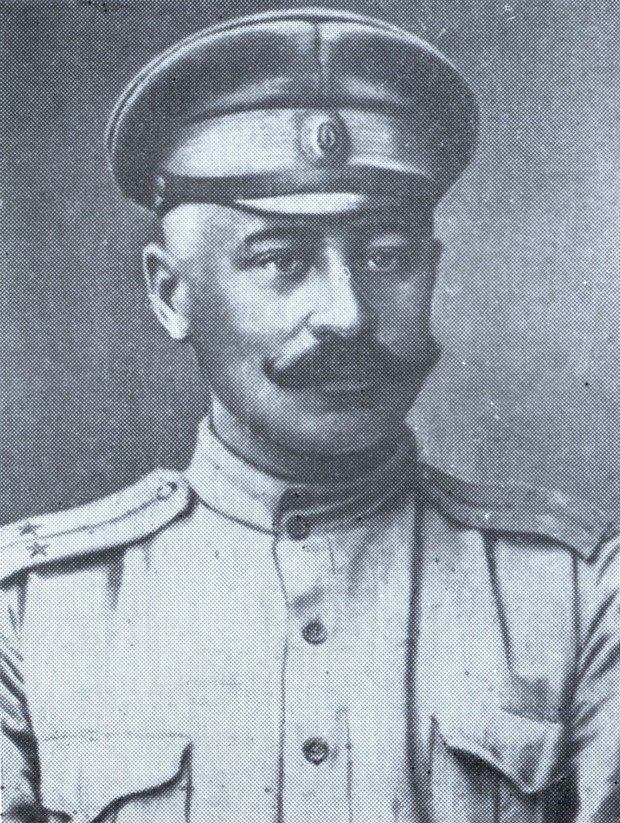
''In the night from 11 to 12 August, the White Czech unit decided to go on the offensive. All this happened suddenly and rapidly. Yudin at this moment was ten steps away from the headquarters, gave orders to his subordinates. And one of the shells exploded directly next to the place where he stood,'' says chief archivist of the State Archives of the Republic of Tatarstan Roman Obrusny.
The urgent message about the death of the Red commander is sent to Moscow. Two days later, on August 14, the resolution of Chairman of Council of People's Commissars Vladimir Lenin is issued about the renaming of the station Krasnaya Gorka into Yudino.
In 1965, Yudino was joined to the capital of TASSR (Tatar Autonomous Soviet Socialist Republic). But the villagers habitually continue to call themselves Yudino citizens, not residents of the million city. Everything changes in the year of celebration of the century anniversary of Yudino. On behalf of President of Tatarstan Rustam Minnikhanov, large-scale repair works begin in the village. As soon as possible, 70% of the roads in the village were repaired at 160 million rubles. Almost the same amount was allocated for painting facades and roof repairs. Seventeen yards received a new look. The reconstruction of the Lokomotiv stadium is in full swing, and last week the stone was laid in the foundation of the future roofed ice arena. Young Yudino inhabitants will also have their own station — new Culture House.
''The greatest achievement — Railwaymen Palace of Culture. This is the central square, which will be completely renovated. We are waiting for the Russian Railways to make the decision on the transfer of the object to municipal ownership,'' says head of Kirovsky and Moskovsky districts of Kazan Sergey Mironov.
It is no coincidence that the inhabitants celebrated the 100-year anniversary of the village in the square in front of the Railwaymen Palace of Culture. But the big concert will not be the final chord, large-scale transformations will continue next year.
''The solution of these problems is impossible without the development of the economy of the republic. The main component in the implementation of any project — transport infrastructure and railway issues. We have full opportunities to solve all these problems,'' said President of Tatarstan Rustam Minnikhanov.
''No matter how much we love our equipment, locomotives, the way, after all, people are the main capital. And taking care of this capital is the main concern of the company,'' said Oleg Belozerov, Chairman of the Board of Russian Railways JSC.
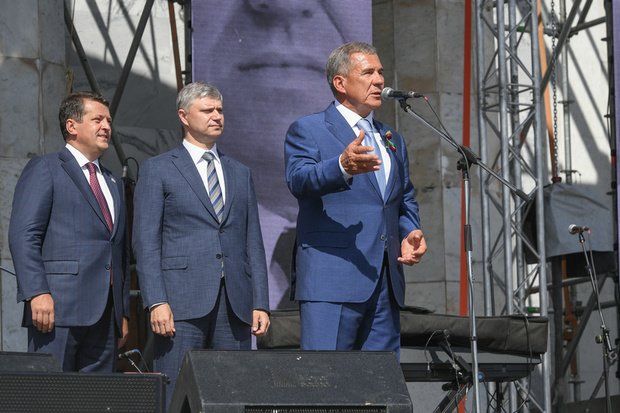
The first lesson
On September 1, the country celebrated Knowledge Day. Correspondents of 7 Days programme visited the first lesson in a multinational school.
The school in the village of Tsipya, Baltasinsky district, is difficult to call an average educational institution. There study 308 people from 18 nearby villages. But the main feature is that the local education is based on multinationality and multilingualism.
Unfamiliar speech sounds in each classroom. A lesson of native Udmurt language is underway in this class. More than half of all school students are Udmurts. Iraida Anatolyevna has been teaching children for 25 years. Once she was sitting here at a desk in this school. Then she graduated from the Philology Department at the University of Izhevsk and returned home. Now it is her duty to pass on her experience and knowledge to the future generation. According to the teacher, every year it becomes more and more difficult for her to teach her native Udmurt language. And it's not about methods, and not textbooks. The danger is all-consuming globalization, from which educators seek salvation in these lessons.
''The programme is sufficient to know the language. What is more — at a high level. But the current generation of primary school has little command of the native language. Rather, it is the influence of television, besides the Russian language sounds everywhere in the kindergartens,'' Iraida Chernova says.
It should be noted that the village of Tsipya, Baltasinsky district, has always been multi-ethnic. Tatars, Udmurts, Mari, Russians have been living next to each other for centuries. But there is one very important point. The Baltasinsky district has always been considered a Tatar-speaking area. Tatars make up almost 85% of the population. But, despite the numerical superiority of the Tatars, no indigenous people living here were assimilated. They are not lost among the Tatar-speaking population. They have preserved their ethnic identity. It was teaching their native language that allowed people to raise children and live without interrupting their native culture.
The new reform of the national education system in this school has not brought any major changes. Native languages have always been taught. Another thing is that after the entry into force of the new amendments to the law on education, parents have the right to choose which language is their native language. If earlier along with, for example, native Udmurt children were trained Tatar as the second state in the republic, now in the schedule there is only one Udmurt as native (3 hours a week) remained. Therefore, many families, especially mixed marriages, have made their choice in favour of the language of communication — Tatar.
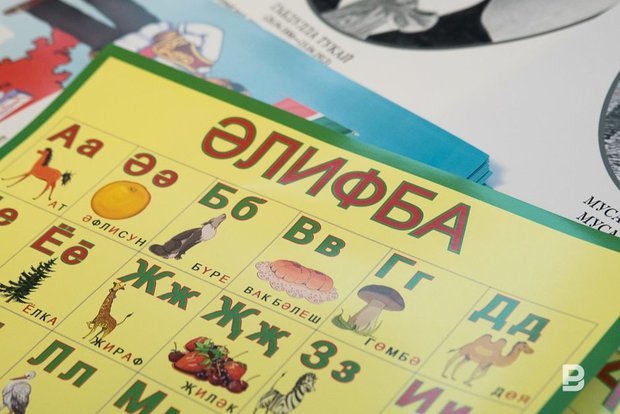
Parents admit that the choice of their native language is a dilemma for them. One language is really native by blood, by mother, language of ancestors, another — not less native language of the neighbour, language of communication, which also it would be desirable to know.
Garifzyan Galiev is 91 years old. The historian and educator, former director of a school in Tsipya, veteran of the Great Patriotic War almost all his life devoted to the study of cultural history of many peoples of this region. Back in 1965, he created a small, as it seemed then, school museum of friendship of the peoples. As a result, over the past decade, the museum has collected tens of thousands of exhibits, testifying to the rich history of living peoples. This museum has long gone beyond the school, and some of the exhibits were passed to the national archives. Garifzyan Galiev believes that national policy begins at school.
Buses will be launched between villages and district centres
The work on the establishment of bus service between regional centres and villages is coming to an end in the republic. The first buses will travel between the villages already in September. However, some have already started the operation. In Arsky district, they decided not to wait until funding is provided and launched the buses at their own expense.
This year, the Arsk Auto-Transport Enterprise will receive 3,5 million rubles from the state, as the year is almost coming to an end. 3,5 million is more than many others. Because the amount of money is equal to the number of kilometres. One kilometre is 51 rubles from the point of view of the state. The more routes, the more kilometres, the more subsidy. Next year it will be 8 million rubles, because there is a whole year ahead. The numbers are different in the districts, but the principle is the same. Pestrechinsky district, for example, has drawn new routes this year at 2,3 million rubles. There are three routes, but the villages they cover are as much as 25. One of the routes alone is with a length of 40 kilometres. Residents of Pestrechinsky 'Vladivostok' — the village of Yantsevary — waited for 3 years until their settlement were included in the route.
''It costs 700 rubles to call a car, but where to take money from? No jobs, no money,'' locals say.
The residents of Konsky rural community, just 5 kilometres from the city center, can't believe that their existence now is not limited only to garden and one horsepower. There is only one horse-drawn transport in the village, not every family has even a horse. Residents of the village accepted the news about public transport with enthusiasm.
''Pensioners and children are particularly affected. It happens that it is necessary to go to Pestretsy, but not every family has a car,'' the inhabitants shared.